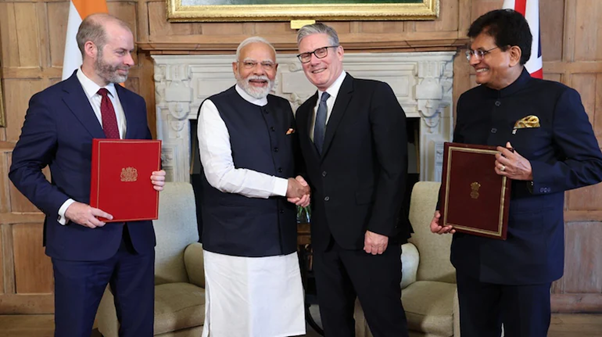
A view has been expressed after India signed the Comprehensive Economic and Trade Agreement (CETA) with the United Kingdom (UK) ruing that by recognising voluntary licensing as the preferred route to promote access to medicines and technology transfer, India has given up on the right to grant compulsory licenses (CLs) and its leadership of the Global South on access to affordable medicines. A closer look reveals, instead, the sure-footed confidence of a growing innovation-led economy.
Let us look at the full text of the Intellectual Property Rights (IPRs) chapter of the CETA, not just one sentence. It is important to note the context of voluntary licenses from the point of view of treaty interpretation. It is in Section A of the chapter dealing with general provisions, and not in Section E dealing specifically with patent rights, which states that nothing in the chapter shall limit right to grant CLs. The objective of the chapter is that the protection and enforcement of IPRs should contribute to the promotion of technological innovation and technology transfer. It affirms the rights and obligations of the parties under the Agreement on Trade Related Intellectual Property Rights (TRIPS) of the World Trade Organisation (WTO) including the Declaration on TRIPS and Public Health, which not only confirms the right to grant CLs but also the freedom to determine the grounds for such grant. It also demonstrates India’s intent to focus on TRIPS flexibilities, and not add to TRIPS minimum standards and obligations.
While recognising the preference for voluntary licenses to ensure access to medicines as every patented medicine may not be amenable to reverse engineering, the text reaffirms the full right to use all the flexibilities available for putting in place public health measures, including CLs. Further, it gives the parties full freedom to determine what constitutes a national health emergency, when CLs can be granted even without making an effort to obtain a voluntary license. Clearly, the preference for voluntary licencing is meant solely to promote collaboration among willing businesses.
The medicine innovation ecosystem is costly and complex. India offers cost-effective solutions to global pharmaceutical companies. With 100% FDI permitted in medical devices and greenfield pharma projects, they are investing millions in research and development operations based in India. India, the pharmacy of the world, is rapidly emerging as an innovation and digitisation hub for the sector. The more than 100 Indian Global Capability Centres (GCCs) in the healthcare sector support diagnostics and drug discovery, employing 40 percent of global GCC workforce.
All this requires protection of innovators’ rights, including through IPRs. Indian patent filings have shown double-digit growth consecutively for the last six years, with 15 percent of them from the medical technology and pharmaceutical sectors, second only to computer technology sector. India supplies 25 percent of UK’s medicine requirement. Collaborations between the Indian and UK industry incentivised by the CETA will further cement the relationship while maintaining the right of India to grant CLs where required to ensure affordable access to medicines.
India has been the leading voice of the Global South since IPRs entered trade rule-making in the Uruguay Round. India ensured in 1989 that no additional resources would be required to be committed for enforcement of IPRs, and the next year stepped in to conflate CLs and government use into ‘other use without the authorisation of the right holder’, what eventually became the present title for CLs in TRIPS. When the world was facing growing HIV AIDS cases, particularly in sub-Saharan Africa, India was at the forefront to get the ‘Declaration on the TRIPS agreement and public health’ in the Doha Round in 2001, followed by the waiver decision and the TRIPS amendment allowing export of medicines made through CLs in 2003 and 2005. At the national level, Section 3 (d) was inserted in the Indian Patent Act to prevent patent evergreening. This approach, using available flexibilities in TRIPS and enabling generic medicine production, has withstood legal scrutiny in courts, has been widely appreciated in the Global South, and emulated by many of them.
After Covid-19 struck, India joined hands with South Africa to pursue further flexibilities for Covid-19 vaccines, resulting in the WTO Ministerial Conference in 2022 providing further flexibilities for CLs, including obviating any need to initially seek voluntary licenses. The Pandemic Treaty agreed in the WHO in May this year is a recent example of India supporting the Global South cause to enable geographically diverse manufacturing and reduce over-reliance on limited actors. The treaty encourages patent/license holders of pandemic-related health products to forgo or otherwise charge reasonable royalties to developing country manufacturers.
Of course, more needs to be done, both to ensure access to affordable medicine to all as well to pursue Global South goals. India has to carefully straddle its growth aspiration and protection of the interests of the last man on the street. But this is in the domain of domestic policy, not international treaties.
*Atul Kaushik is GDC Fellow at RIS. Views are personal. Usual disclaimer applies.
Author can be reached out at atul.kaushik@gdcin.org



